
LOCOMOTIVE JOURNAL
JANUARY 1957
BRIGHTON (2)
PAGE 33
Steady attendance at meetings has been maintain by the “regulars” who deserve all the
praise for keeping the Society interests on top, and letting the “lobby critics” see that we are
a live branch who intend to give every assistance to our L.D.C. in upholding our agreements
against the strong opposition we find all too frequently from the other side of the table. The
interpretation of some conditions of service from that quarter calls forth much criticism and
hard feeling from the men when they find themselves frustrated by a management side who
seem to try by all means to make the accepted conditions and agreements read only to suit
their requirements. We should like a much better attendance and an increase in confidence
and support for our L.D.C.
Our Annual Retirement and Social Fund Presentation was held on November 17 and a jolly
evening was enjoyed by all. Bro. A. Taylor made presentations to eight of our retiring
comrades from the footplate and the Motorman’s cab. This was the first year that the Steam
and Electric Retirement Funds had joined forces which we hope will continue.
F.W. Musk
Branch Chairman
Railway accident on British Railways
Southern Region
Central Division
LEFT - RIGHT; Office Gent, Mr Urrie, Alf Brown (Cleaner's Foreman), Unknown,
Ian Munro (B'ton Enginemen), Bill Terrill (Nhvn Driver) & Jack Baker (Pasha) c1957
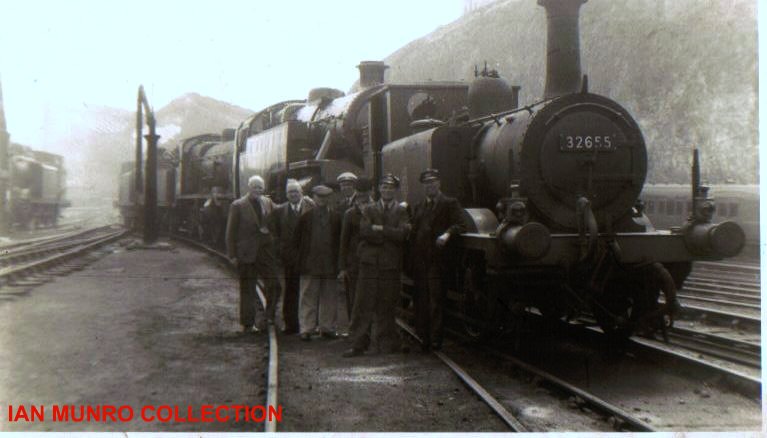
LOCOMOTIVE JOURNAL
FEBRUARY 1957
ON THE SURFACE
A PAGE FOR MOTORMEN
By D.K. PULLEN
Page 46
SHED MASTERS, taken in the herd, are not really a bad lot. Most of them have far more
work to deal with, more staff to supervise and more knocks to take than the majority of the
underlings on British Railway. It can be said, with truth, that some Shed Masters have even
made an attempt on occasions to get down to a real appreciation of the problems, which
perpetually bother the representatives of the Electrical staff under their supervision. Yet it
must be regretfully stated that very few of these depot chiefs could claim an encyclopaedic
knowledge of agreements concerning the workaday conditions of Motormen.
If therefore comes as a pleasant surprise to learn that at least one Shed Master has revently
been checking up on certain agreements to the extent that he now able to quote “Chapter and
Verse” from all manner of important documents. It is not for us to complain at this revelation, for it at least shows that somebody does cares…….Still, it does make things awkward for our people.
From our point of view, it is by no means easy for our L.D.C. representatives to keep abreast
of the constantly changing conditions of service. In the past 12 months, for example, there
have been revisions of agreements governing the promotion and transfer arrangements, duty
rostering, meal-breaks, etc., and it is difficult to keep pace with all these changes. To produce a new conditions of service book at this time would almost certainly render such a
publication out-of-date before it could be distributed. However, the E.C. has this matter very
much in mind and a new booklet is to be prepared at the earliest practical moment.
Meantime, branches will be kept fully informed and the more important changes reported in
the Locomotive Journal. A recent R.S.J.C. Minute under the heading Variation of Rostered
Turns – Trainmen has caused a deal of discussion in certain districts and it may be useful to
give minute in full: -
R.S.J.C. Minute L5
With reference to RSC and ASLEF Min. No.65-18/4/28; the representative of the ASLEF
submitted a request that clause 2 of Min. 65- 18/4/28 in regard of rostered turns of Trainmen
should be amplified as follows:
“Motormen and Steam Enginemen to have full entitlement to the turn for which they are rostered on the weekly duty rotation list, unless such turn is cancelled.”
The ASLEF representatives submitted that Min No.65 provides that in certain circumstances
it may be necessary to vary rostered working but at the present time alterations were taking
place in certain Regions much too frequently instead of being confined to exceptional cases.
They urged the Railways to tighten up the arrangement as this frequent alteration to rostered
working was having a detrimental effect on the retention of staff to the service, particularly in the case of younger members who were not so amenable to shift working as some of the older staff.
The Railway representatives, whilst unable to agree to the amplification of Min. 65 as
suggested by the ASLEF, undertook to direct attention of all concerned to the desirability of
minimising the alterations to the rostered working of Trainmen as far as practicable.”
L.D.C.’s will now be keeping a sharp watch on the antic of the roster clerks. Any complaints
from individuals regarding duty alterations should be taken up with Shed Master, and if no
satisfactory explanation is forthcoming the whole matter of rostering at the depot concerned
should be listed for discussion. With perseverance and joint L.D.C. approach will solve this.
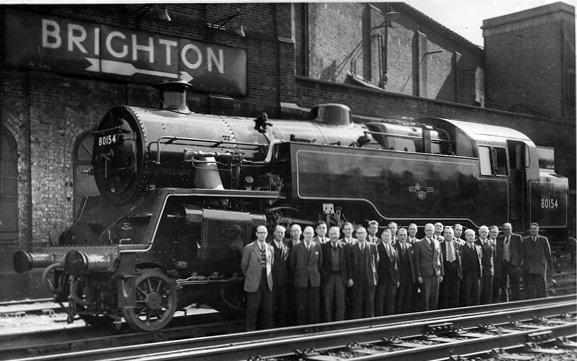
PAT SALMON COLLECTION
The last Brighton built locomotive on 20th March 1957
BR STANDARD TANK 80154
LOCOMOTIVE JOURNAL
MAY 1957
PAGE 177
NORWOOD BRANCH.
The men’s side of Norwood L.D.C. consider that the matter of employment of young persons should be first raised by the B.T.C. with the trade unions; it is still the policy of the A.S.L.E. & F. that 18 is the age for employment on the footplate. If this was done guidance could be given to L.D.C.’s as to how to work those who are already on the footplate and not yet 18. It would be most unfair to except Firemen over the age of 18 to do all the night work and those under all the day work, and in our opinion could not operate in a successful manner. Young person engaged today on the footplate are in numerous cases not strong enough to do the work. We agree some youths are remarkably good for their age, but in the main, no. We consider that after the B.T.C. and the Unions have dealt with the matter, it should then (if necessary) be dealt with by all L.D.C.’s on a Regional and Sectional basis. We also consider that if the job of the Footplate Staff was made more attractive such matters as this would not arise.
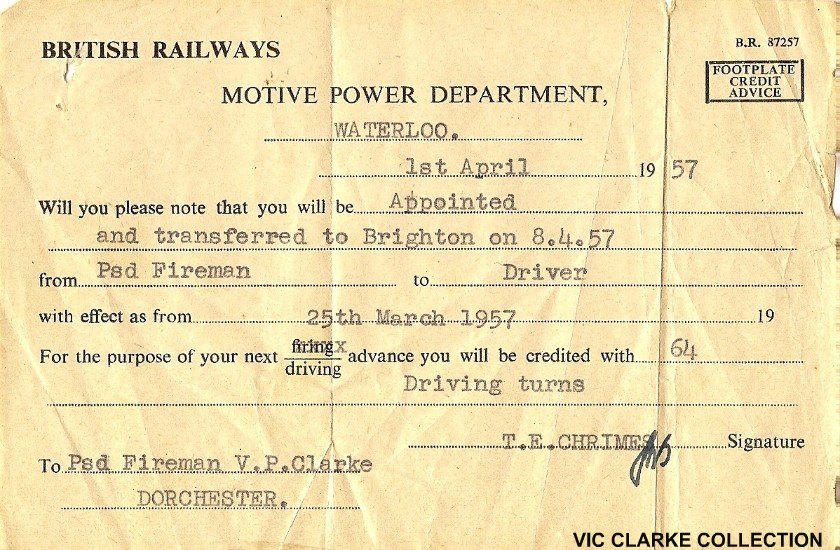
LOCOMOTIVE JOURNAL
APRIL 1957
PAGE 148
SELHURST BRANCH.
Over three months have passed since the change of Branch Secretary, and I am m=now settling down to work with “Bill” in the background ever ready to advise if and when required. Selhurst branch has always been a team, and I am proud of the excellent spirit among us, especially around the L.D.C. with Bro. Taverner as Secretary and Bro. Richardson, Chairman.
It is pleasing to note that the latest amendment to the P.T. & R.A, Clauses 22 and 23b, have not worked out too badly for our men now that the “Starred” men are known.
Good Friday, April 19, brings us once again to the annual re-union. Don’t forget the date. Have an evening out with the old boys and enjoy the grand show put on for all to remember.
Branch meeting date for April is Tuesday 16. Keep up the good attendance. We should like to see reports from other Electrical branches regularly, just to learn we new on the map on the Southern.
C. FOOT
BRANCH SECRETARY
LOCOMOTIVE JOURNAL
APRIL 1957
ON THE SURFACE
A PAGE FOR MOTORMEN
By D.K. PULLEN
Page 118
One of the most interesting features of the British Railways Modernisation Plan is the
promise that 100 m.p.h. trains, diesel and electric, will be the order of the day and that even
greater speeds will be commonplace on certain sections of the line.
Sir Brian Robertson is very enthusiastic about the unfolding Plan. “The developments are
really exciting,” he is reported as saying. “Our owners, the public will be thrilled.” National
newspapers, caught up in this wave of enthusiasm, have applauded this “new lease of life” for the railways. “The public, as owners,” concluded one Editorial, “must see to it that this new spirit is kept up and that the British Railway system retrieves its traditional reputation.”
There can be little doubt that the prospect of slashing an hour or so off existing long distance
express schedules will appeal greatly to “our owners.” A comfortable seat, a first class meal,
air conditioned compartments - all at 100 m.p.h.; these are very desirable, even essential,
features of travel in this day and age. A great idea of engineering skill and colossal sums of
money are already being spent on this worthy projected we are promised the beginning of the New Era within 18 months.
This is a bold plan; an imaginative plan; a plan which is being energetically pursued by
responsible people on both sides of the industry. Is it, then, too much to hope that some small consideration will be given in this welter planning, to the added responsibilities, the extra stresses and strains which higher speeds and heavier trains will bring to the Front End of these modern expresses? Will our employers, the Commission, show equal enthusiasm for the wellbeing of that section of the railway staff which, more than any other, holds the key to the “ traditional reputation” of British Railways - the Drivers of the new diesel and electric locomotives?
At the moment the Commission’s representatives insist that as a general principle there shall
be only one man on these new traction locomotives but they are prepared to discuss
exceptional circumstances where a second man might be provided. For our part, we say that
in general practice there shall be two men in front, though we also will be ready to give
consideration to special cases where the second man may be dispensed with. It is obvious not possible to argue full merits of our case in a short article of this sort, yet it may be helpful to raise for general discussion a viewpoint long held by those men who for many years have accepted the added responsibilities, the physical and nervous strains, which go with single manning - the viewpoint of Electric Motormen.
First, there is the question of Economy, and it is upon this factor that the B.T.C. bases its
claim for single manning. In the past few years there has been a real effort by Management
and Unions alike to ensure the greatest possible economy of labour in all departments of the
railway service. Recommendations of the Productivity Council; Joint Consultation; Work
Study Groups; all these new features are aimed at securing the maximum productivity at the
least possible cost. What are the practical possibilities of affection further economies within
the Motive Power Department without seriously impairing the present services?
For many years we have know the “Razor Gangs” whose job it is to examine the rosters at
each depot with the object of pruning alll uneconomic working. Spare men on “Southern
Electric” have been cut to a figure well below practical working allowances in many cases -
with the result that overtime, extra week end work and even Rest Day working are essential
to the Management if existing schedules are to be maintained. The Southern Region’s electric services provide a first class example of economic oystering in modern railway practice - as the suburban time tables will testify. First main line services tot the south coast, single manned in all cases, have provided the most economical service of any section of the
Operating Department throughout British Railways. What has been the cost to the man at the Front End? The answer to this question must form the subject of a separate article.
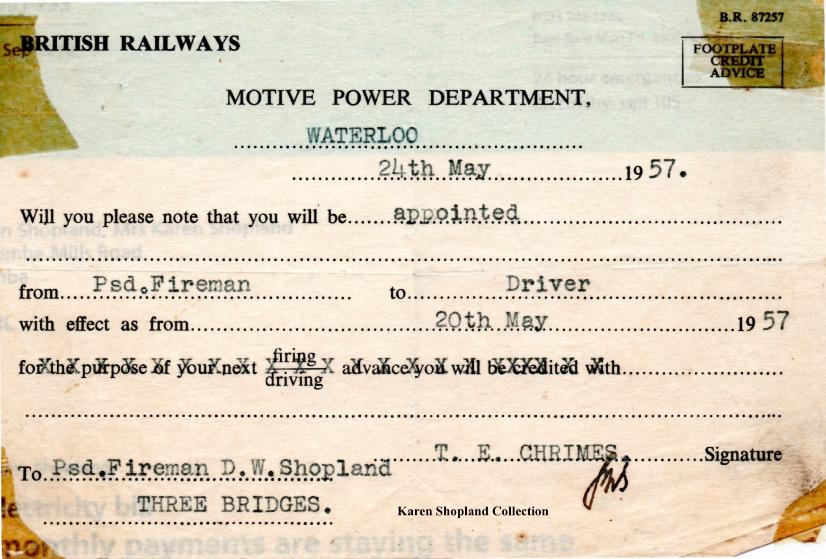
LOCOMOTIVE JOURNAL
MAY 1957
ON THE SURFACE
A PAGE FOR MOTORMEN
By D.K. PULLEN
Page 154
Last month we pointed to the various means by which both sides of the railway industry are
pursing the question of maximum productivity at minimum labour costs. The Southern
Region’s London suburban and south coast routes were quoted in support of the contention
that the utmost economies have ALREADY been effected wherever single-manned multiple
units trains are in operation. Reference to fast trains, quick turn-round, and intensified
service prompts the question, “What has been the cost to the man at the Front End?”
The transition from steam to electric or diesel is not an easy phase in the career of a driver.
Many men in the first few months of electrical work find that there is a vast deal of difference in the two jobs. It is one thing to stand behind the familiar “security” of a locomotive boiler, with another pair of eyes and hands available on the footplate. It is entirely another to sit immediately over the running rail, moving all the time in an altogether more intense service-knowing that all the responsibilities is yours…. Headaches, presumably caused through added concentration and a certain psychological “pull,” are often experienced by our men during those first months. It is all very well for the newspapers to talk of there being “no case for a fireman on a fireless train,” but there is rather more in this job than first meets the eye.
It can, and doubtless will, be argued that since the Southern Region multiple unit trains have
been successfully manned for many years by one Driver, it is unreasonable to insist on
double-manning of locomotives at this late stage. Not a bit of it. It all depends, as Joad would have said, on what you mean by “successful.”
Motormen have failed to pass the necessary medical examination and have consequently been removed from track duties. It would be wrong and dangerous to attempt here to develop any theory in explanation of the root cause of these failures. But every Motorman who reads this article will know only too well the nature of the complaints which have necessitated the removal of our colleagues from track duties – and there are the strongest possible arguments to be adduced in support of the theory that such complaints have a relationship to the everyday stresses and strains of handling high-speed trains.
SHOCK-of the type experienced by all too many of our men when a gang of platelayers
scrambles out of the path of an oncoming train; when, indeed, factalities occur in this
manner; accidents at level crossings and other points at which the public have access to the
line; the hundred-and-one other minor shocks which leave the Driver temporarily numbed of
and weak at the knee. The accumulative effect of such happenings often too much for the
human frame to take – hence failure to pass the Medical Officer. This is a high price for our
men to pay.
Those men who handle express stock will readily acknowledge the extra tension experienced when travelling at maximum speeds. Fifty to 60 miles per hour may seem a jog-trot and is taken in the stride. But feel the difference on a dirty winter’s night when the needle on the “clock” creeps round to the 75 mark. What then of 100 m.p.h., cruising speeds? Obviously the increased speed will bring added tension and increased physical strain to the man at the front. If the Modernisation Plan means what it promises – faster traffic in an intensified service – some consideration has to be given. NOW to the well-being of the people who will be called upon to handle the new-style locomotives. Your Executive Committee has the problem very much in mind. Depend upon it, the Society’s policy on manning will be vigorously pursued by your representatives at all levels of discussion.
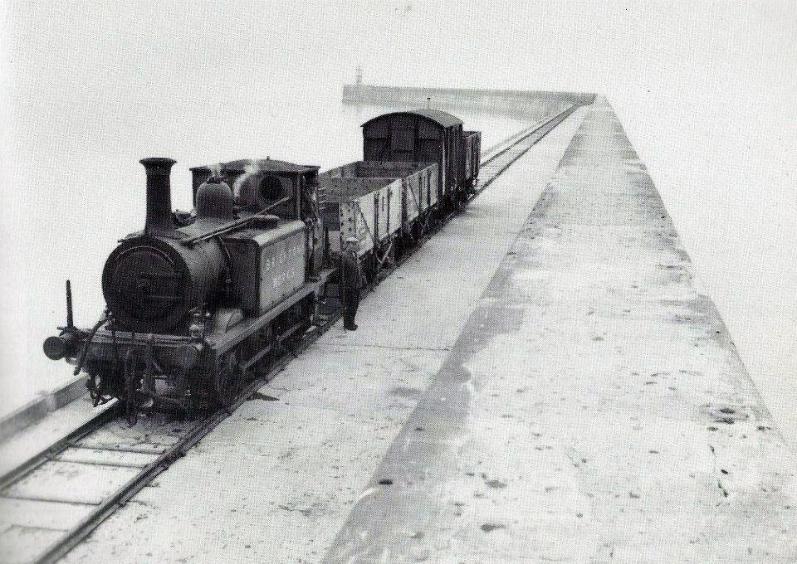
LOCOMOTIVE JOURNAL
JUNE 1957
PAGE 219
SELHURST BRANCH.
On Good Friday, April 19, Selhurst held its Annual Re-union, when 92 retired and active members and their friend sat down to enjoy a tea at the East Croydon Social Club. After tea, our E. C. Member, Don Pullen, presented Bill Boulton with an inscribed wallet containing a sum of money, and to Mrs. Boulton a barometer, given by the Electrical branches as a reward for the sterling services rendered by Bill over the last 25 years, and a tribute to the able assistance rendered by Mrs Boulton. Bro. Pullen, ably assisted by E.C. Member Bert Howes, Bro. E. Cordell and retired member W. Roberts, thanked Mr. and Mrs. Boulton for their services to the Selhurst Branch. During the evening we had the pleasure of the company of our Organiser, Bro. W.J. Cleaver.
The evening was spent enjoying a cabaret and dancing, ably got together by our L.D.C. Secretary L. Tavener.
Truly a wonderful evening, enjoyed by all.
C. FOOT
BRANCH SECRETARY
W. Boulton Seniority (19/07/1909)
LOCOMOTIVE JOURNAL
JUNE 1957
PAGE 218
NORWOOD BRANCH.
M.I.C. attendance excellent; to YOUNG ‘UNS reaching 23, get to the classes; we have asked for all of that age in Links 1 & 2 to be passed.
If our friend Bro. Pullen was referring to Norwood in his March article, he is OFF THE ROAD. We have no extra spares at Norwood, overtime is being made up to keep the job moving and Drivers are working here form other depots. As a Steam L.D.C. we do care for both Steam men and Dual Link men, and we still have to realise that we still have steam trains and they must run. The Steam Driver is entitled to the same consideration as the Dual Link Driver, although Don Pullen’s article does not appear so. I have every sympathy for the Dual Link Driver; ny tip to them is “DON’T TAKE CHANCES.”
Rates of pay should be £16, £12 and £8; hours per week, 40; pensions at 60, half standard rates of pay. It is with regret that we find that Bro. Ted Bowsher will be missing from the Sectional Council this year. To Ted, thanks a lot!
DUM SEPRO SPIRO
P.K. WILLSHAW
PHIL WIMPORY COLLECTION
Horsham Driver Dicky Doel driving Bullied’s Electric Loco
Walter Doel, seniority date 07.06.1920 – Eastleigh /Horsham. Walter, was known as Dick and later Engineer ( this was because he stated that drivers were locomotive engineers according to A.S.L.E.&F.). He was a fireman at Horsham and when the Slades Green contingent arrived in 1926, was put back cleaning for a couple of years. Dick was one of the ‘Hornby’ men at Horsham.
Information by Brian Cooke
LOCOMOTIVE JOURNAL
HORSHAM BRANCH
JUNE 1957
PAGE 215
Many moons have passed since a report from this branch has in the Locomotive Journal. This does not mean that we have been inactive. After our 17 days’ fight in 1955 we formed a Retired and Presentation Fund, this after a lapse of many years. Our first function was on Good Friday, when 70 members said farewell to two of our members, Bros. J. Wilkins and F. Little, who had both completed over 48 years’ service.
During the evening’s entertainment Mr. Mitchell, our new Shed Master, presented Bro. Wilkins with a standard lamp and Bro. Little with a striking clock. Keep up the good work lads, and don’t forget “Sam” is the next to retire, later this year. But before that we shall have our monthly branch meetings, which I hope you will all attend.
W. Hutchings
Branch Secretary.
A.J. Wilkins Seniority 01/04/1909
F.C. Little Seniority 05/07/1909
Railway accident on British Railways
Southern Region
Central Division
Hastings 8th June 1957
Involving Ore Motorman Charlie. Page
SEE SUB PAGE
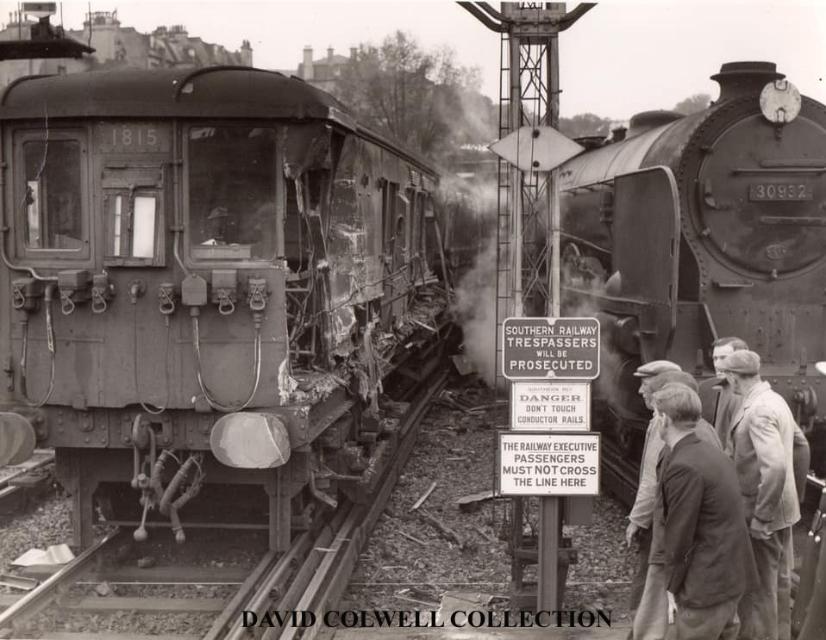
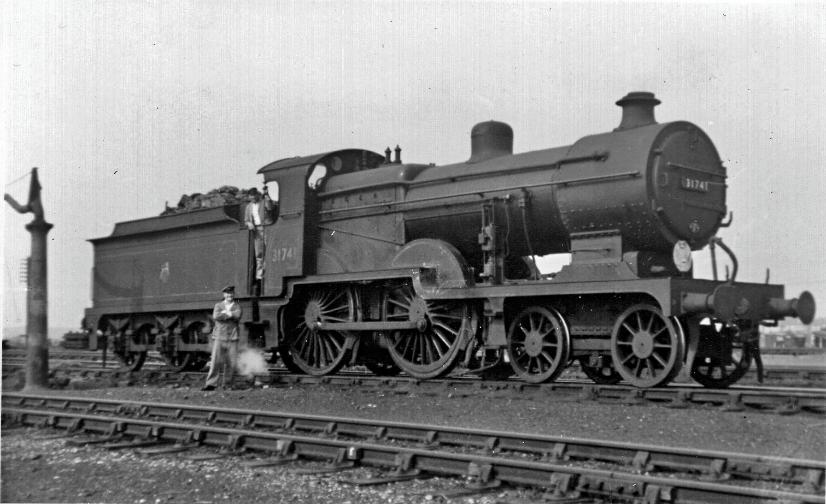
Eastbourne Enginemen Dick Coombes standing next to enginethe other Engineman is unknown
LOCOMOTIVE JOURNAL
EASTBOURNE
JUNE 1957
PAGE 219
Another Re-union and Social Evening on April 27 brought members old and new together again. Bro. W.G. Osbourne, Motorman at Eastbourne, attached to Ore branch, who retired recently was presented with a wrist watch; his wife received an umbrella.
Mr. Rodgers, D.M.P.S., in making the presentation, gave a review of the changes in the railway world during George’s years of service. George, who had been a member 40 years, suitably replied; he joined in 1908, had taken part in all our troubles with authority for improved conditions, having divided his time between Orpington and Eastbourne. Best of luck, George. May time deal with you both lightly. Our thanks to those who provided the catering and entertainment. May the good work continue.
Branch Reporter.
W.G. Osbourne Seniority 06/05/1908
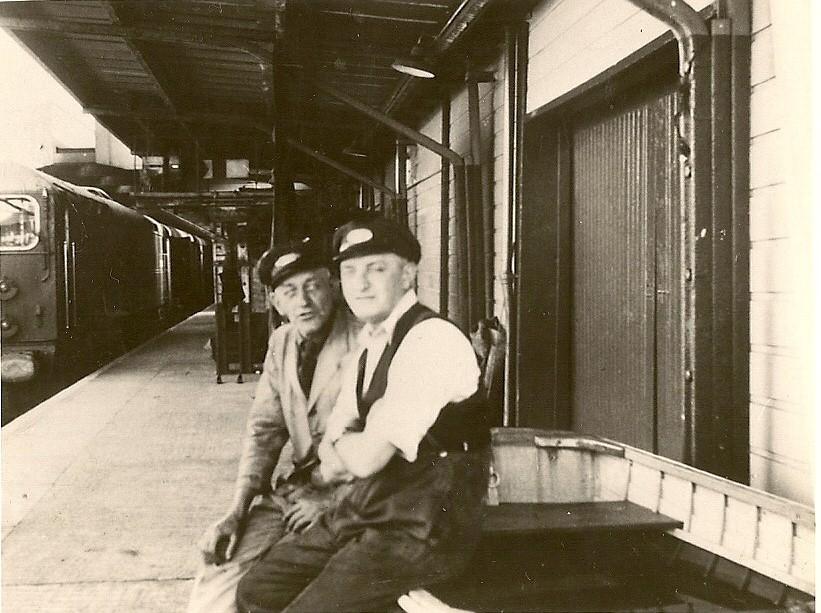
Ron Terrill Collection
Newhaven Enginemen Alf Charman & Tim Norman
Photo taken at Newhaven Marine Station and a Hornby loco No. 2001? is seen in the background awaiting departure
LOCOMOTIVE JOURNAL
JUNE 1957
ON THE SURFACE
A PAGE FOR MOTORMEN
By D.K. PULLEN
Page 190
The 1957 Motormen’s Reunion held in Croydon recently was a very special occasion for
members of Selhurst Branch and, indeed, for many visitors as well. Besides being the high
spot of the year for many of our retired comrades and their wives, this was also the occasion
of a rather special presentation. Bill Boulton, for many years Branch Secretary at Selhurst –
and before that of West Croydon in the old days – retired from the Secretaryship and the
Branch paid due tribute.
It was an honour to be called upon to make the official presentation which took form of an
inscribed leather wallet, complete with cheque, and it was particularly pleasing to
acknowledge also the wonderful services to the Society, through her husband, of Mrs. Boulton who received a handsome barometer – a token of the very real appreciation of the past and present members of Selhurst Branch.
Bill Boulton is the perfect example of everything that is best in the Trade Union movement.
Always ready to give an encouraging lead to the young man who shows promise in the
branch, Bill is respected wherever Motormen to discuss railway and trade union business.
Starting in the railway service in the year 1909 at West Croydon, he first took office in the
Society, as Branch Collector, in 1913. Not once since that time has he been out of office –
holding almost every conceivable job as a Society representative. Branch Chairman,
Secretary for five years at West Croydon and at Selhurst for over 23 years, he has served on
many L.D.C.’s and has seen innumerable colleagues come and go. Delegate to Annual
Assemblies of Delegates, District Council delegate in the days when this work was purely
voluntary; delegate to Croydon Labour Party and Trades Council for many years – crowned
by a long spell as Sectional Council representative, where he did prodigious work for
Motormen. Here is the advice given by Bro. Boulton to all young men who aspire to
representative positions in the Society: -
“There’s nothing clever in the work, but you must have enthusiasm and a CLEAR CLASS-
CONSCIOUS approach to all the many problems. There have been many times when I’ve
wondered seriously whether the results were worth the effort –when friends have advised,
‘give it a rest’; but the ever-present urge to serve has prompted me to carry on. The old true
slogan of the early Socialists, ‘From each according to his need; ability; to each according to
his need; is one which I can commend to you all. If more people practiced it in this bad old
world, there wouldn’t be so much hate and misery.’
On behalf of all Southern Region Motormen, thanks for everything, Bill, and all good wishes for a happy spell in the Chair at Selhurst during the remainder of your railway service. Bro. Charlie Foot has a tough assignment as your successor, but we all know he will carry on the good work – and he will receive the same support from a grand Committee as you have had down through the years.
Two of our motormen colleagues Bro. Ron Pratt, Branch Secretary at Wimbledon, and Peter Collens of Selhurst have secured Society Scholarships to Summer Schools this year, thus earning our congratulations. More and more of our branches are taking an active interest in the educational side of our work, and it is encouraging to that Motormen members are
sufficiently advance to be able to take advantage of this sort of tuition. We all wish Bros.
Pratt and Collens a pleasant and instructive time at the N.C.L.C. and Labour Party Schools
and we look forward with interest to their reports on their return.
Footnote: The hold –up in this year’s issue of the long awaited lightweight uniform trouser
issue is for some reason that the type of cloth to be used in the new garment did not measure
up to the standard required by the Executive Committee, and we have asked the B.T.C. to
think again about the type of material to be used….. No further comment needed!
DISCTRICT COUNCIL REPORT No.1
The May quarterly meeting of the Council was held n May 13, with Bro. S.R. Lunniss
(President) in the Chair. Organizer Cleaver and E.C. Member D. Pullen were in attendance,
the latter deputizing for Bro. H. Howes away on annual leave.
Two branches were not represented Acton Town and Wimbledon.
Criticism was levelled at the new method of the Area Membership statement and, arising from the discussion thereon, the Council are reverting to the previous practice of tabulating the Membership Statement in full with the addition of a column giving information on individual branch sales of the Journal.
Bro. Pullen in his address provided the delegates with a detailed account of the work of the
E.C. over the past three months. The wages position was fully reviewed and the lessons
arising from the Government’s policy of attaching “strings” to wage settlement was well
understood. Redundancy and Manning was of course the outstanding item of the report, Bro.
Pullen being allocated additional time to deal specifically with it. The questions put to him
and the discussion that folled gave a true indication to Bro. Pullen of the interest of thee
London membership in the vital and basic problems for the future. Other highlights of his
report were the Port of London Authority Wages and Pension agreements, the P.T.&R.
Arrangements (Clause 2), and the visit to Poland by the E.C. delegation. Bro. Pullen’s report
was very well received.
Organizer Cleaver provided the Council with an interesting account of some of the
happenings within the area that had required his attention. He spoke on Rest Day working,
Colour Vision failures, and the wages position. He made specific reference to the collisions at Portsmouth and Welwyn Garden City. On the latter collision, and the subsequent
developments, Bro. Cleaver stressed once again the absolute need of members reporting
every signal irregularity, thereby enabling Head Office to collate the fullest possible
reference. Delegates were also informed of the increase of 574 in membership over the past
two years for this area.
LOCOMOTIVE JOURNAL
JULY 1957
ON THE SURFACE
A PAGE FOR MOTORMEN
By D.K. PULLEN
Page 226
Without getting ourselves bogged down in technicalities, let’s have a word this month on the
subject of the Guard’s Brake Test. No need here to waste valuable space on the importance of always making an adequate test - the punishment meted out to our men when something goes wrong in this connection indicates quite clearly that nothing will soften the hearts of those people who sit in judgement if it is alleged that the Motorman failed to carry out, to the letter, his instructions on Testing The Brake before starting.
Quite often, particularly at points where attachments are made on the main line, the late
running of one portion will cause a bit of a flap among the staff concerned. In their natural
anxiety to get the train away on time some seemingly small duty may be overlooked. Too late, it is discovered that all is not well with the brake and someone’s for the high jump. Don’t be caught. Always remember that a Motorman’s uniform from the moment on he cease to be a human being possessed of human fallibilities; he become a robot - just another “Ernie.” The bouquets to be gained in our job for helping things along seem very few; brickbats when something goes wrong are plentiful enough.
While on the subject, have you ever experienced the difficulty of attracting the attention of the Guard when you are not satisfied that an adequate brake test has been made? Consider the following scene:-
The Motorman of a Brighton train is standing by his cab-door on platform 17 at London
Bridge, talking to the Foreman Motorman just prior to starting. The necessary test at the
front end have been made and as time goes on it becomes clear that the guard has overlooked this part of his duties.
The Motorman becomes a little anxious and begins to make motions from his end of an eight-car train that a brake test is required. He begins by clenching his fist and jerking his left arm up and down violently. This goes on for a few moments. The passengers look on in wide-eyed wonderment, but the Guard, engrossed in driver other duties, has failed to notice the performance. Something else must be tried. Hereupon, the Motorman commences to clap his hands together horizontally in a manner remarkably reminiscent of a demented baboon while at the same time hopping up and down in a most alarming way. (It is by this time noticeable that several passengers step down from their compartments, quietly closing the door behind them, with the all-too-obvious intent of waiting for a following train. Clearly this driver is mentally deranged.)
There follows much shouting and whistling and rattling of lights and circuit-breakers in a
further endeavour to attract attention at the rear, but it is not until the Forman-Motorman
dashes down the platform frantically signalling four leg-byes that it dawns upon the Guard
that no test has been made and save the situation. The Motorman by this time embarrassed
beyond expression, pulls up his near-side window and is thankful that it’s time to start.
It is, of course, expecting far too much ofModernisation to suggest that some from of
telephonic communication be installed in trains for the use of Motorman and Guard. But
surely in a machine which it is not beyond the wit of man to devise some system of bell-
communication between the man at the front and the man at the rear? Perhaps our L.D.C.’s
can keep the problem in mind for discussion at future meetings with the Management?
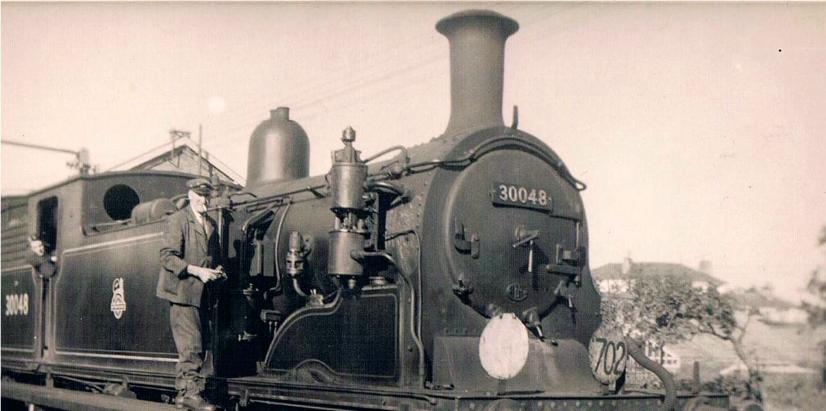
He always wore his bicycle clips, which he was presented with a pair, his grandson tells me he was proud of them!”
Rodney Burstow
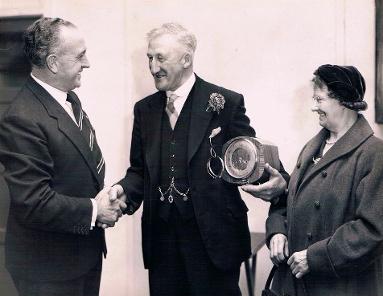
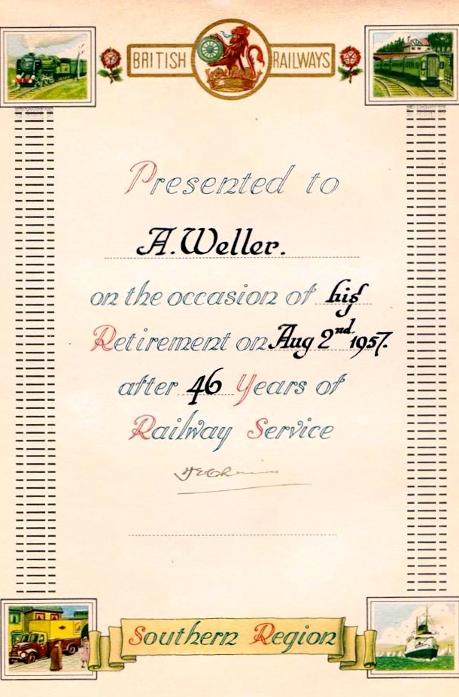
LOCOMOTIVE JOURNAL
SEPTEMBER 1957
ON THE SURFACE
A PAGE FOR MOTORMEN
By D.K. PULLEN
Page 298
One of the marvels of the modern railway practice is the manner in which the average
Motorman sorts out from the maze of hieroglyphics know as the “Roster” that part of the
Monkey-Puzzle which relates to his own duties on any given day.
When the staff representatives go along to scrutinise the draft workings at the commencement of the winter or summer services things are bad enough. Complaints have been officially lodged for a number of years about the manner in which duties are set out. From time to time promises are made that something will be done. Nothing, in fact, is ever done.
But the complexities confronting experienced roster-scrutineers at the time of issuing the
printed rosters are nothing compared with the jig-saw puzzle with which the Motorman has to contend after these duties have been posted for about a fortnight. For in just a couple of
weeks the diagramming wizards are well capable of achieving the impossible. Duties which
had hitherto appeared so involved that no alteration could possibly add to the confusion are
overnight transformed.
This business of over-pasting the printed rosters is really threatening to get out of hand.
Notice boards at most Electrical Depots are so crammed with alterations that the men
detailed to perform the depot duties experience increasing difficulty in finding sufficient
space for everything contained in the dispatch-bag. At holiday times any vacant space on a
wall or door is pressed into service as a temporary notice board. Small wonder that someone
occasionally misreads his duties.
In the past month I have received correspondence from L.D.C and Depot representatives
giving scores of examples of amended duties relating to the present summer diagrams. In
many cases the staff representatives complain that there is no apparent reason for the
alterations and in any case they have been given no opportunity to scrutinise the amendments before they are posted. Quite often the duty a man is booked to work bears absolutely no resemblance to the turn originally approved by the roster scrutineers. If this state of affairs is allowed to develop, roster scrutiny will become farcical in the extreme. Local Department Committee have been struggling with this problem - as separate units - for far too long. It is to be hoped that discussions on the subject of Standardisation of Summer and Winter Diagrams will soon be held at top level with object of cutting out much of these seemingly unnecessary and irrupting amendments to the weekly rosters.
The difficulties of rostering men to cover additional wok at holiday times are well appreciated by the staff. The heavy traffic on Southern Electric has to be handled every year by a complement of Motormen much too small to tackle the job efficiently unless some pretty hefty sacrifices are made by the men concerned. Hence we get extended rosters and minimum rest intervals at the very time when a shorter working day is in every way desirable. It is because of inadequate staffing that the Diagram Section find themselves in such difficulties that the rosters can only be produced a matter of hours before the services are to be introduced. Can anyone wonder that the men resent being kept in the dark about their turn of duty unit the very last moment at holiday times? Only by increasing the staff at certain vantage points can this problem be solved. Our local representatives have pressed the point at every opportunity in recent years. It is in the interest of both management and men to staff up the Electric Depots adequately.
LOCOMOTIVE JOURNAL
AUGUST 1957
ON THE SURFACE
A PAGE FOR MOTORMEN
By D.K. PULLEN
Page 262
In the newspapers recently a prominent Member of Parliament was reported as having
strongly protested that British Railways station buffets and tea-rooms are a national disgrace.
If the sight and smell in public places of “unwashed floors,” “tables swimming with tea and
beer,” etc., give rise to such an outcry, the imagination fairly boggles at the thought of an
M.P. visiting staff rooms on some Southern Region railway stations.
While it is true that years and years of weary negotiation at L.D.C. level occasionally win a
modern gas-stove to replace the type of water-heating apparatus originally rejected by Noah
when equipping his Ark, in the main our mess-rooms are deplorable. Victoria and Brighton
rooms are a disgrace. Out stations like Crystal Palace (what name was ever more
misleading?) simply defy description.
In looking around these places one finds it difficult to believe that many thousands of pounds are being allocated to staff welfare each year. The good offices of those Management and Trade Union representatives who sit on the body known as the Joint Advisory Council for Welfare pass almost entirely unnoticed by the bulk of the people who should be benefitting therefrom. The Joint Advisory Council meets regularly to discuss all matters concerning the wellbeing of the staff of British Railways, and it’s a safe bet that the Modernisation Plan will eventually get around to providing reasonable premises in which the staff may enjoy proper facilities for partaken of a meal. Whether or not this happy vision will materialise within the lifetime of those still young enough to hope, is somewhat bigger gamble.
This promise of Pie in the Sky is not noticeably nourishing to our older colleagues, however,
and our Local Departmental Committee representatives are very much concerned with the
immediate problem. Secretaries Len Traverner and Harold Gagilhole (Norwood Junction and Bricklayer’s Arms) in particular have pressed the local management for action in the matter and a suggestion has been made that Motormen should be rostered for P.N. relief only at stations where there adequate facilities are provide - such as at terminal stations or at depots where Foremen Motormen are stationed. This recommendation has been considered by Sectional Council, but the difficulties of rostering in this way have been argued strongly by the management and the position has not been satisfactorily resolved.
Our representatives can be relied upon to press the matter further; meanwhile, it is up to the
men at all depots to insist that the mess rooms are kept in the best possible state of cleanness
and that elementary standards of hygiene are maintained. The once-a-week swill-round with
a bucket of water which has previously removed some part of the filth from other staff rooms on the station is simply not good enough. Dustbins should not be placed within a mile of any room wherein meals are taken. Wash-basins and sinks are not the best repositories for used tea leaves. There is a great deal to be done if we are to succeed in making the job as
comfortable as we all want it.
Our representatives will have a much easier task if a effort is made NOW by everyone to
show management that we will not be so treated. And, when the improvements are finally
made, let’s be sure that no one of us can be accused of abusing the facilities provided.
LOCOMOTIVE JOURNAL
SEPTEMBER 1957
A.A.D. REPORT
Page 299
This year’s A.A.D. will go down as one in which it was to be noted that the future fighting strength is certainly not missing from our ranks.
The delegates, many of them young to Conference, expressed in debate without any loss of temper or personalities the real feeling of the rank-and-file.
as member of our Orgnanisation we should feel proud that with the changing over of the B.T.C. from steam to diesel and electrification in the near future, a careful watch is being maintained to ensure that “the front end” is to be for the men of our craft only.
It was very pleasing to see the confidence the delegates gave to our General Secretary and to the Executive Committeee to continue in the best interests of us all on such questions as wages, conditions and hours.
Many things in the E. C. Report were accepted. Of the cases which were the subjects of appeal against the E.C. decisions, four were sent back for further consideration after the Group delegates concerned had put forward constructive evidence. I myself felt they deserved reconsideration.
Our Society’s policy on the H-bomb Test and Colour Bar soon had delegates on their feet. It was pleasing to hear the fine contribution of the General Secretary on the Colour Bar problem, and all delegates were pleased with the result on these two items - No Test, No Bar!
I have referred to the goodly proportion of young delegates, and they certainly deserving of special mention. We need have no fear for the future as many of them are doing their job with pride and enthusiasm as trade unionist.
In these comments on our Annual Assembly I must draw your attention to the Political Fund. We must improve our numbers in membership of this Fund. While we keep wishing to “get rid of the Tories” let us build up a fund to increase our representation in Parliament. We have got to watch our step and be prepared.
“The spirit of the Conference was: Forward the A.S.L.E. and F.”:
In closing I would like to thank all who placed their confidence in me as A.A.D. Chairman. Best wishes to one and all happy results on your Conference Reports.
“Lennard of St. Leonards”
A.W. Lennard
was elected as Chairman
for the 1957 A.A.D.
T.U.C CONFERENCE
1957
LOCOMOTIVE JOURNAL
OCTOBER 1957
W.J. CLEAVER
DISTRICT No.7
During the period since my last Journal notes Coroners’ Inquests have had my attention at
Reading St Pancras and Woking, and Ministry of Transport Inquiries at Old Oak Common
goods, Clapham Junction (two inquiries), Charing Cross (two inquiries), Pitsea, Stonebridge Park, Westbourne Grove, Parkeston Quay, and Haywards Heath.
At Haywards Heath the inquiry was held to investigate the circumstances responsible for a
serious accident to one of our young Fireman members. Whilst working a goods train the
Fireman injector “flew off” and after several futile attempts to re-start it, it appears that our
member concluded the men who prepared the engine had failed to fill the tank. Without
indicating his intention to the Driver, who at this stage was looking out for signals, the
Fireman apparently climbed on to the tender in order to lift the tank lid and, whilst so doing
was struck by an overbridge ad sustained severe head injuries. This is an unfortunate accident that should not have taken place. Rule 126, Clause 7, reminds enginemen of the dangers of leaving the footplate whilst the engine is in motion, and, if the circumstances are such that it is absolutely necessary for such action, the rule provides for certain arrangements by which that operation with reasonable safety.
LOCOMOTIVE JOURNAL
OCTOBER 1957
ON THE SURFACE
A PAGE FOR MOTORMEN
By D.K. PULLEN
Page 334
With the Modernisation Plan the talking - point of the day, it might be as well to pause for a
moment and take a look back down through the years to the very beginnings of electrification on the railways of Britain.
The following summary comes from the pen of a Motorman who grew up with electrification
Bert Cooper of Selhurst branch, over 40 years a Motorman at Streatham Hill depot. Bro.
Cooper retired in August and thus severed the last link between present - day conditions and
the good - bad days of the Southern Railway’s “Overhead” system.
(We have indeed much pleasure in publishing Bro. Cooper’s summary and in expressing
our deep appreciation of the service to the branch and society.-Editor).
The history of the electrification of the Southern Railway and its constituent companies dates from the year 1903 when, having obtaining Parliament powers, the London, Brighton and South Coast Railway instructed its consulting engineer to prepare a report on the question of conversion of the suburban lines.
This L.B.S.C.R. conversion was on the 6,600-volt, single phase system, partly because of the development of that principle in the first years of the century and partly because, even at that early date, main line extensions to Brighton and the south coast were envisaged. Extensions to Crystal Palace from both Victoria and London Bridge were completed before the first war.
Others, to Coulsdon, Sutton, Eastbourne and Brighton, were authorised but due to the war
only the Coulsdon and Sutton lines were converted to single - phase traction - and there not
until 1925.
In 1915, the London & South Western Railway began operating over the Kingston
roundabout and the Waterloo line via Putney. The early progress made in the design of low
voltage current traction decided the directors to adopt this system. Extensions were made in
1916 to Shepperton, Hampton Court and Claygate, and after the amalgamation of 1923
direct current was adopted as the standard for future conversations.
The year 1925 saw the conversion of the lines to Guildford and Dorking, and 1930 that of the Windsor line. 1926 was memorable for the opening of the first section of the South Eastern & Chatham electrification under the auspices of the Southern Railway Railway Company. originally this electrification had been planned just after the 1914-18 war to use 1,500 volts D.C. system on suburban lines has been progressive and culminated in opening to electric traction of the two routes to Sevenoaks. The Sanderstead line and the Nunhead - Lewisham loop were due to be opened to electric traction. The old L.B.S.C.R. single phase lines were converted to low voltage D.C. in 1929 but some of the overhead masts still exist as signal gantries.
A notable decision was made in 1930 when electrification to Brighton and West Worthing
was begun and turned the Southern definitely into a believer in the electrification of densely
trafficked main and suburban lines. The first stage to Redhill, Reigate and Three Bridges was opened on July 17th, 1932, and the southern half of the line on January 1st, 1933. Work on the 60 mile extension to Lewes, Eastbourne and Hastings was begun at the end of 1933 and public electric service was inaugurated on 7th July, 1935, when a total of 444 route and
1,156 track miles was operated electrically by the Southern Railway.
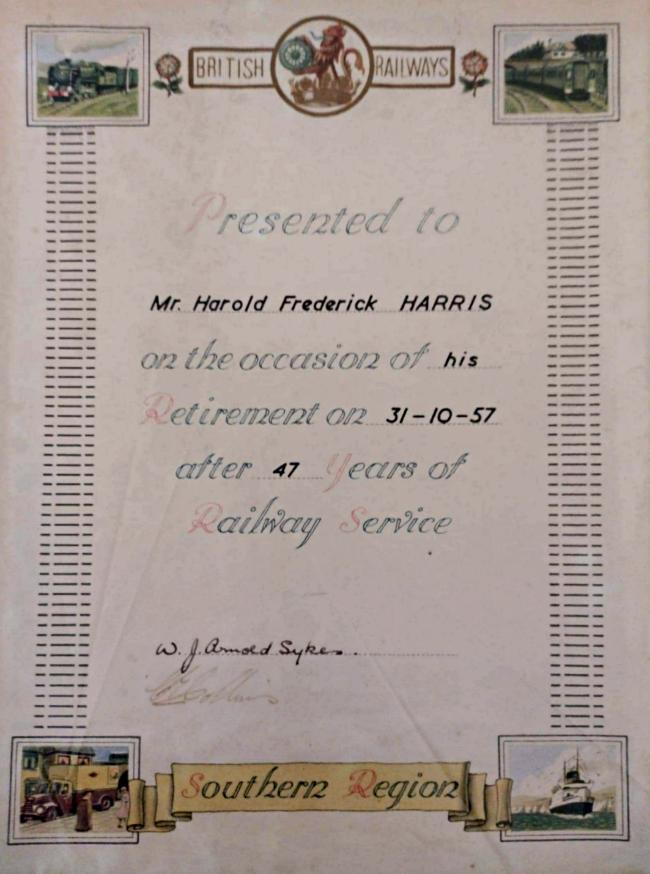
LOCOMOTIVE JOURNAL
NOVEMBER 1957
ON THE SURFACE
A PAGE FOR MOTORMEN
By D.K. PULLEN
Page 370
The winter season is now upon us and it’s a safe bet that a good many men booking on in the early hours of a nice crisp, hoary morning will be wishing they’d remembered to book this draughty cabs way back in the summer.
Trouble is, of course, that in the summer months any draught of cool air is most welcome to
the Motorman stuck for hours in a sweltering cab, clothed in a uniform quite obviously not
designed for tropical conditions. (By the way, the matter of summer-wear trousers came up
for another airing at a meeting of the R.S.J.C. recently, and there are hopes of a satisfactory
settlement of our differences on the subject of suitable material soon. More on this later.)
Thanks to L.D.C. pressure, the subject of draughty cabs has been taken up by the
Management, and first reports of their most recent efforts - Unit 4123, returned to service
from Lancing Works, for example - are most favourable. These cabs, I understand are now
100% draught-proof and the heaters are consequently much more effective. Southern Region
Sectional Council has also done much to bring about this improvement and, as is well know,
many experiments have been tried over the past few years.
Now that the problem has been overcome on suburban units we shall have only ourselves to
blame if we suffer from the cold in future. It is up to everyone to faithfully report draughts in cabs on every occasion - not merely when berthing units at a maintenance depot. On main
line stock, and here I have the “Nelsons” very much in mind, this problem is more acute and
its solution still, apparently, some way off. Nevertheless, even these can be improved and
complaints should be properly recorded.
While on the subject of cabs it might not be out of place to mention the fitly conditions of
some of the older-type units. At a Joint Consultative meeting at Victoria recently, L.D.C.
representatives in the Stewarts Lane D.M.P.S. area were given an opportunity to have their
say on the matter.
The main problem here has been the reluctance of female cleaning staff to work within a
broom’s length of the cab-mounted electrical equipment. Cleaners, male and female have
usually considered themselves to be “Unauthorised Persons” when it comes to entering the
Motorman’s cab. Consequently no brush, broom or duster disturbs the dust and other refuse
accumulated behind the equipment.
In summer the heat becomes oppressive, necessitating the opening of the front cab windows
when running. This dust swirls in a storm for a few moments until finally settling in the rough serge of the Motorman’s uniform. There should be no need for this sort of discomfort. I understand that certain promises were made at the Victoria meeting regarding the cleanliness of cabs, and our representatives are hopeful that some good will result from their efforts.
Meanwhile we ourselves can do much to improve the state of the cabs in which we spend so
much time each day by being a little more careful with cigarette-ends, matches, toffee-papers, old newspapers, etc. In the absences of ashtrays and refuse-baskets there is only one place for all these items.
That place is NOT inside the cab
LOCOMOTIVE JOURNAL
NOVEMBER 1957
PAGE 398
At our Branch meeting held on September 29 a very pleasing ceremony took place; a presentation to Bro. A. Wenham, “Alf,” who recently retired after 46 years’ membership of this society. Bro. Wenham was the recipient of a Westminster chiming clock given by his fellow trade unionist.
One of his mottoes, repeated, to his workmates, was “Never let your contributions lapse; you never know hen you will need the assistance of the Society,” as he made himself had the help of this organization when it dealt with his case of injury whilst on duty.
Other member of this Branch had cause to be thankful for the assistance cause to be thankful for the assistance they received in cases of “Accidents on Duty.” One member had just received approval of an award of £50 in respect of an accident that happened in 1919, and he is due for retirement in December. Here’s proof of the value of keeping your “cons.” paid up.
During this last two to three years members of this Branch have received nearly £300 in compensation awards that have been contested by the Society.
So, please assist your Secretary by giving him your full report as soon as you can, of any accident that may befall you – and keep your card clear!
D.W. Sargent
Branch Secretary.